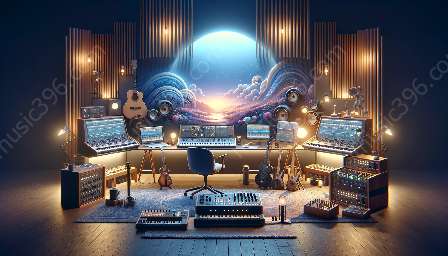Traditional music composition and performance techniques have undergone a significant transformation with the introduction of MIDI controllers. MIDI, short for Musical Instrument Digital Interface, is a protocol that allows electronic musical instruments, computers, and other devices to communicate with each other to facilitate the creation, editing, and recording of music.
Understanding MIDI Controllers
MIDI controllers come in various forms, including keyboards, drum pads, and other instruments equipped with sensors and buttons that transmit MIDI data to connected devices. They enable musicians and composers to manipulate sound in ways that were previously impossible using traditional instruments alone. The impact of MIDI controllers on traditional music composition and performance techniques is multifaceted and has brought about both challenges and opportunities for musicians.
Impact on Music Composition
MIDI controllers have revolutionized the process of music composition by offering a wide range of creative possibilities. With MIDI technology, composers can easily input, edit, and arrange musical notes and phrases directly into software, allowing for seamless integration with digital audio workstations (DAWs). This has significantly expedited the composition process, making it more efficient and versatile. Additionally, MIDI controllers provide composers with access to an extensive library of virtual instruments and sound effects, expanding the sonic palette and possibilities for experimentation.
Furthermore, MIDI controllers enable composers to easily manipulate and control various parameters such as pitch, velocity, and modulation, providing a level of precision and expressiveness that was previously unattainable through traditional instruments alone. Composers can now create intricate, layered compositions with nuanced articulations, dynamic changes, and intricate manipulations of sound parameters.
Impact on Performance Techniques
For performers, MIDI controllers have redefined the boundaries of traditional music performance techniques. With the ability to trigger and manipulate a wide array of sounds and effects in real-time, performers can create immersive and dynamic live experiences that transcend the limitations of acoustic instruments. MIDI controllers empower performers to engage with technology in a way that enhances their expressiveness and creativity on stage.
Moreover, MIDI controllers facilitate the integration of electronic elements into live performances, allowing for seamless transitions between acoustic and electronic sounds. This fusion of traditional and electronic music elements has led to the emergence of innovative genres and styles, blurring the lines between traditional and contemporary music.
Challenges and Opportunities
The integration of MIDI controllers into traditional music composition and performance has presented both challenges and opportunities. While MIDI technology offers unprecedented flexibility and control, it also requires musicians to adapt to a new set of skills and workflows. Understanding and mastering MIDI controllers and associated software can be a learning curve for traditional musicians.
However, the opportunities presented by MIDI controllers are vast. Musicians can access a virtually limitless array of sounds, textures, and effects, transcending the constraints of traditional instruments. This opens up new avenues for artistic expression and creativity, enabling musicians to explore uncharted sonic territories.
Conclusion
The impact of MIDI controllers on traditional music composition and performance techniques is undeniable. The integration of MIDI technology has revolutionized the way music is composed, performed, and experienced. As the music industry continues to evolve, MIDI controllers will play an increasingly vital role in shaping the future of music, providing endless possibilities for musicians to push the boundaries of creativity and innovation.


